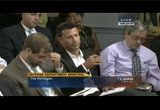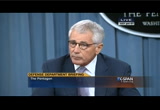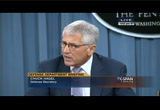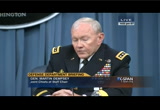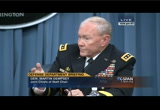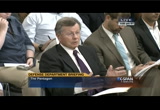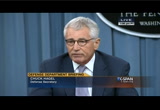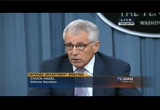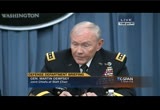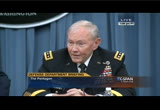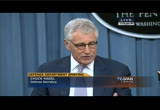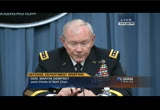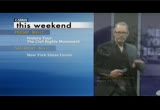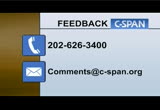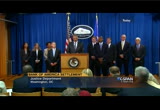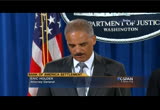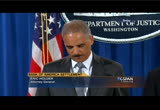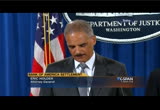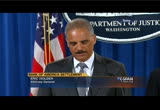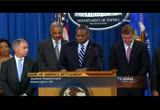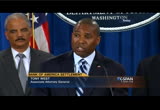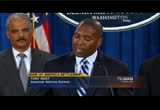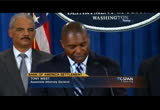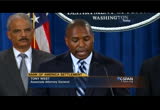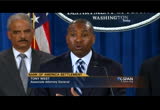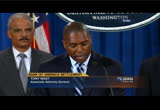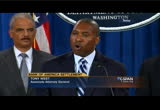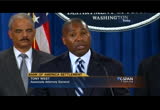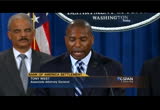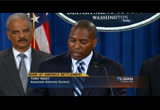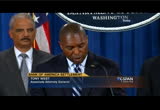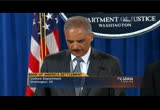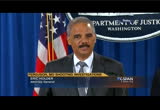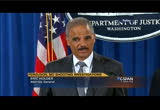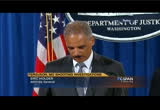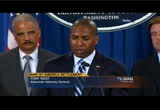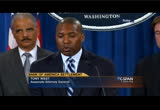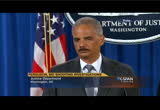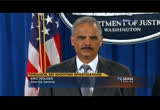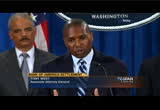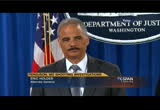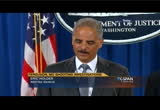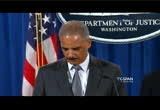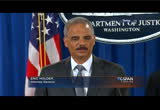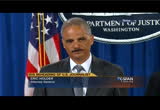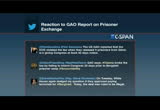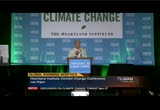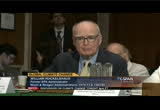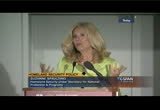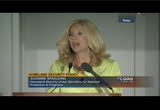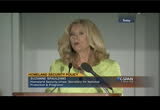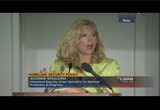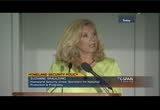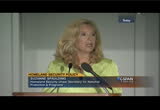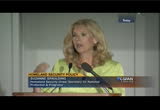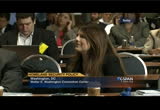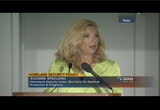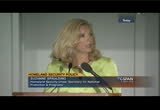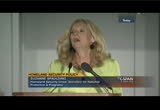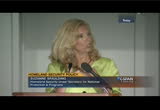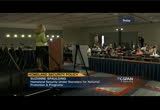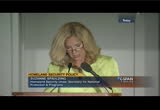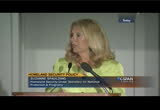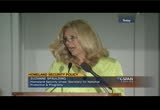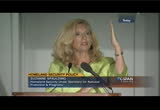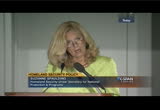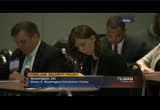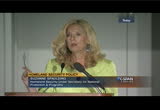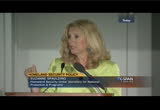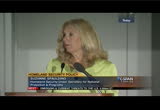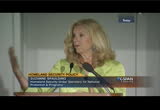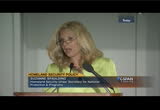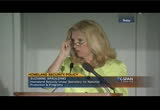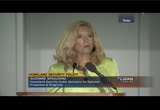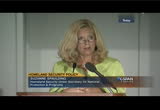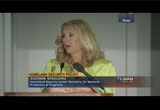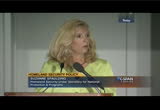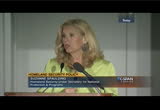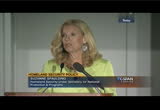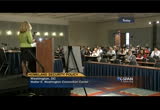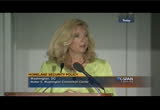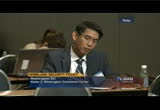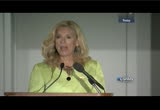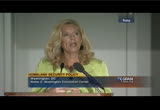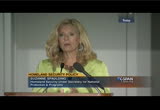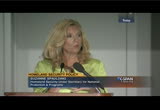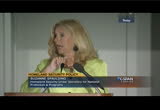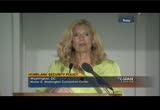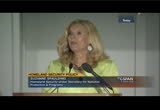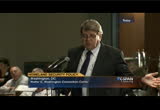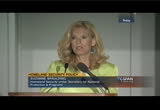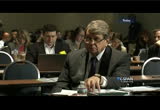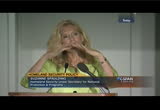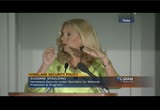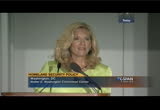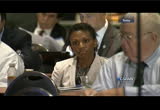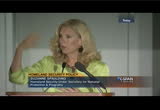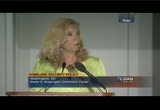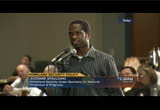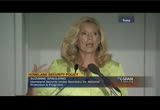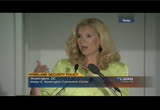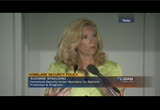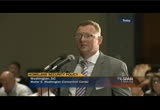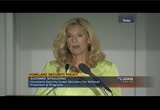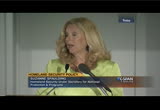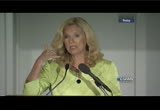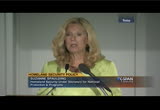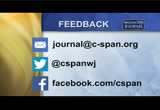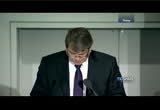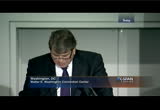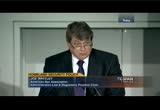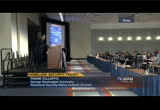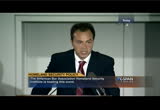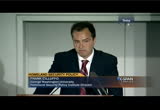tv Key Capitol Hill Hearings CSPAN August 21, 2014 4:00pm-6:01pm EDT
4:00 pm
problem. >> the charges of mission creep in iraq, going beyond humanitarian and protecting -- does the pentagon believe it has the authority -- have you talked to the general consul? do you need any additional authority going forward? the president has been very clear on mission creep. thats made it very clear he will not allow that. he has been very clear on what our mission is. we comply with the war powers have. how many people we consult with our do wel all the time on
4:01 pm
have the domestic authority, do we have the international authority on all actions? as we do on everything we do. i refer you back to the president's comments on mission creep. this is not about mission creep. public bethe american steeled for another long, hard slog against isis? in july, you painted them as an imminent read. not even george bush when he was hyping the war in iraq all the saddam hussein and imminent threat. he called him grave and gathering. you talk about defeating isil over time. should the public the prepared for another long, hard slog fighting al qaeda in the fight .o eliminate isil >> as far as the imminent
4:02 pm
threat, i think the evidence is pretty clear. when we look at what they did to mr. foley, what they have threatened to do to all whatcans and europeans, they are doing now, i don't know any other way to describe it other than barbaric. they have no standard of decency, of responsible human behavior stop i think the record is clear on that. imminent readat to every interest we have, whether it is in iraq or anywhere else. speak aboutheard me the fact that we've gone from a to thefocus on al qaeda recognition that in the aftermath of the arabs ring, i described a lack of government -- you have heard me talk about all of that will stop we have
4:03 pm
and inloosely connected some cases affiliated that run from afghanistan across the arabian peninsula into yemen and the horn of africa and into north and west africa. , the conflict against those groups, most of which are local, some of which are regional, some which are global, that's going to be a very long contest. ideological. it is religious in many cases. ask me if the american people should steeled themselves or this long conflict, there will be required participation, particularly in a leadership role to build coalitions, to provide unique capabilities we
4:04 pm
necessarily all the capabilities to work through this thing using three different military tools. one is direct action. persons and facilities are threatens, we will use direct action. if told to use it for direct actions, we will use it but we have not been asked. the second is building partner capacity. we've got to have them take ownership of this because , they aref we own it not going to be that interested in it. enabling, which is to say enabling our partners, which you see them doing in iraq with security forces and i think you will see them enabling function as well. thisu were talking about thread and a war weary america. i think most americans are
4:05 pm
threatwhat is the isil to us here at home. could either of you talk about the threat isil poses to americans and should americans be paired for a perpetual war on terror? >> i will take the first run on that and marty can respond as well. jim, what happened in this country on 9/11, 2001. when you ask the questions about should americans see this as any kind of imminent threat or what doubt if there were many people who would anchor was much of a threat the day before 9/11. that happened a few years ago. this country is far better
4:06 pm
prepared today in every way. terrorism is not new to the world. of terrorismation and ideology the general was talking about, with resources now, present a whole new dynamic and a whole new paradigm of threats. the sophistication, technology, money, resources, all of that is different. cannot ask the question of ourselves as leaders who have responsibilities to the security of this country. it wasn't that big a deal, they are far away -- we don't have the luxury. every day, the intelligence community and the leaders, regardless of who the administration is or the secretary of defense is or the chairman is deals with this every day. we don't want to face that again ever. we have to look at this from the reality of what is out there,
4:07 pm
but also what could be out there and what could be coming. sure, it is a long-term threat. >> is it a calculation that isil represent a 9/11 level threat to the united egg? >> isil is as sophisticated and well-funded as any group we have seen. they are beyond just a terrorist group. they marry ideology, a sophistication of strategic and tactical military prowess, they are tremendously well funded. this is beyond anything we have seen. we must prepare for everything and the only way you do that is take a cold, steely, hard look at it and get ready. is and thediacy number of europeans and other nationalities who have come to the region to become part of
4:08 pm
that ideology. some folks will go home at point. that's why i have colleagues with my -- why have conversations with my colleagues about nato. nevertheless, because of open borders and immigration issues, it is an immediate threat. that is to say, the fighters who may leave the current fight and migrate home. 'snger-term, it is about isil vision. i actually call them isis because it easier for me to remember their long-term vision is the islamic state of iraq and al shon which includes the current state of lebanon, israel and kuwait. if they achieve that vision, it would fundamentally off -- fundamentally alter the face of the middle east and create a security environment that would certainly threaten us in many ways.
4:09 pm
about -- it is a -- its is pumped ability is iraq's responsibility to take care of their own country, but are they already at war with isis? >> do i look like a guy who would answer that question? the declaration of war is a policy decision, not a military decision. estimate on how much these operations have cost so far? considering isis proposes a long-term threat, you need to reshape your 2015 budget to accommodate for that? >> maybe. to theng -- go back reference i mentioned that you've already asked congress in a separate counterterrorism fund for $5 million, half a billion of that for the moderate syrian
4:10 pm
opposition. shaping anstantly budget to assure resources match the mission and the resources and the mission match the threat. it is not a process for wade of the dynamics of a changing, shifting world, requiring resources as you plug them in to your strategy to assure you can carry out that strategy. shifting allare the time on what you think is going to be required. we have had to move assets over the last couple of months to accomplish what we accomplished in iraq. that costs money and takes certain moneys out of certain funds. it is a constant, fluid process as you plan for these.
4:11 pm
the adaptations we have made to our global posture and regional posture in response to the tasks we have been given has been remarkable. it reminds me to never miss the opportunity to thank those who serve in uniform for their incredible agility and courage in dealing with whatever issues confront them. as you know, there's a lot of issues confronting us globally right now. we are answering the call and will continue to do so. there may be a point where i think we are fine for fiscal year 14 and we will have to continue to gather the data and see what it does in 15. >> inc. you very much. -- thank you very much.
4:12 pm
[captioning performed by national captioning institute] [captions copyright national cable satellite corp. 2014] >> here are some of the highlights for this weekend. friday on c-span in primetime, we will visit important sites in the history of the civil rights movement. saturday night, highlight on the new york ideas or him, including cancer biologist andrew hessel. and on sunday, "q and a" with charlie wrangle. friday night on c-span2, writer and religious scholar, wrist the salon. night, lawrence goldstone on the competition between the wright brothers and glenn curtiss to be deeper dominant name in manned flight. american history tv on c-span three on friday -- a look at hollywood's portrayal of slavery. 200 --rday night, the
4:13 pm
200th anniversary of the battle of williamsburg and the burning of washington. and former white house chief of staff discuss how president make decisions. in advance onule c-span.org and let us know what you think about the programs we are watching. and join thel us c-span conversation, like us on facebook, follow us on twitter. >> earlier today, attorney general eric holder held a news conference announcing a settlement with bank of america over mortgage fraud. he also talked about his visit yesterday to ferguson, missouri.
4:14 pm
>> thank you all for being here. i'm joined by tony west, united states attorney for new jersey and the attorney for the eastern district of new york, loretta lynch, attorney for the western district of north airline and and tompkins, acting state's attorney for the central district of california. the tuckey attorney general, jeff conway and the maryland attorney general, the acting inspector general for the federal housing finance agency, michael stevens. and the associate regional director from the item states securities and exchange commission. we are here today to announce a historic step forward in our ongoing effort to protect the american people from financial fraud and hold accountable those whose actions threaten the integrity of our financial markets and undermine the stability of our economy. the department of justice has reached an agreement with bank
4:15 pm
of america totaling over 16.6 billion dollars in penalties and consumer relief will stop this constitutes the largest civil settlement with a single entity in history. addressing conduct it addresses conduct uncovered in more than a dozen cases and investigations. and it addresses allegations that bank of america, merrill lynch, and countrywide each engaged in progressive schemes to fraud. as a part of the settlement, bank of america has acknowledged in the years leading up to the financial crisis that it was, merrill lynch, and countrywide sold billions of dollars of the toxic loans whose quality and level of risk they knowingly misrepresented to investors and to the united states government. these loans contained material
4:16 pm
underwriting defects. there were secured by properties with inflated appraisals. they failed to comply with the federal state and local laws, and they were insufficiently collateralized. yet these financial institutions knowingly and fraudulently marked and sold these loans as sound and reliable investments. we are still on multiple occasions when confronted with concerns about their reckless practices bankers at these institutions continue to mislead investors about their own standards and to securitize loans with fundamental credit, compliance, and legal defects. under the terms of the settlement, the bank has agreed to pay $7 billion in relief to struggling homeowners, borrowers, and communities affected by the bank's conduct. this is appropriate given the size and scope of the wrongdoing at issue. unfortunately, because congress has failed to extend the law ensuring that most of this relief would not be taxable income, this debt relief will
4:17 pm
create tax liability for many consumers. that is why the department secured a commitment from bank of america to pay a portion of a settlement, over $490 million to defray some of this tax liability. and our settlement requires the bank to notify all consumers of this potential tax liability. but that is not enough. today i also call upon congress to extend the tax relief coverage of the mortgage forgiveness debt relief act of 2007. until congress acts, the hundreds of thousands of consumers we have sought to help through our settlements of j.p. morgan chase, citigroup, and now bank of america, may see a significant tax bill just as they're beginning to see the light at the end of a dark financial tunnel. i want to be very clear. the size and scope of this multibillion-dollar agreement goes far beyond the cost of doing business. this outcome does not preclude any criminal charges against the
4:18 pm
bank or its employees. nor was it inevitable over these last few weeks that this case would be resolved out of court. i want to thank associate attorney general west, especially, for his leadership in helping to obtain a resolution we announced today which is both historic and commences with the conduct at issue. i want to recognize each have come together to make this landmark settlement a reality. this is merely the latest example of the important work the president's financial fraud enforcement task force is making possible. this agreement complemented the actions of the task force is working groups including the residential mortgage-backed security's fraud working group, members of which played key roles in advancing this case. i have in order to chair this task force since its inception in 2009 and would like to thank each of the members who
4:19 pm
contributed to this outcome and are continuing to advance a range of open matters both civil and criminal across the country. at this time i would like to turn the podium over to the associate attorney general who will provide additional details. >> thank you, mr. attorney general. thank you all for being here today. this morning, we demonstrate once again that no institution is either too big or too powerful to escape appropriate enforcement action by the department of justice. at nearly $17 billion, as the attorney general noted, this resolution with the bank of america is the largest that the department has ever reached with a single institution in american history. but the significance of this settlement lies not just in its size. this agreement is notable real account
4:20 pm
-- this agreement is notable because it achieves real accountability for the american people. in addition to the billions of dollars the bank will pay, bank of america has agreed to sign a statement of facts in which it admits publicly its repeated failure and repeated failures of its affiliates merrill lynch and countrywide, to disclose to investors key facts about the actual quality of the loans they packaged up into residential mortgage-backed investment securities. the statement of facts details evidence we uncovered in three separate investigations conducted by u.s. attorney ann thompkins of the western district of north carolina, the central district of california represented here by the acting u.s. attorney, and the district
4:21 pm
of new jersey, led by u.s. attorney paul fishman, whose case largely drove the discussions that led to the resolution we are announcing today. his investigation found that merrill lynch new based on its own due diligence that substantial numbers of the loans was packaging in the rmds and selling to investors failed to meet underwriting guidelines, did not comply with applicable law, or were inadequately collateralized. all contrary to representations merrill lynch was making to investors. the cases in california, north carolina, involving countrywide and the bank of america respectively, those also involved in similar conduct with during degrees of egregious this. but all involved bank of america or its affiliates saying one thing to investors about the quality of the loans they were packaging into rmds, yet in reality, knowing the facts indicated something quite different.
4:22 pm
it is like going to your neighborhood grocery store to buy milk that is advertised as fresh, only to discover that store employees knew the milk you are buying have been left dock and you are buying have been out on a loading dock unrefrigerated the entire day before -- un refrigerated the entire day before, yet never told you but the condition of the milk. like you got home to pour yourself that glass of milk, investors such as public pension fund and federally insured financial institutions, they were unpleasantly met with millions of dollars of losses
4:23 pm
when the securities they had invested in soured. the statement of facts doesn't end with the bank's admissions about its securitization of risky mortgage loans. the statement also achieves accountability by requiring bank of america to accept responsibility for faulty loan origination practices that in many cases, resulted in misrepresentations about the quality of those loans to fannie mae, freddie mac, and to the federal housing administration, and also which concluded to the loss of hundreds of millions of dollars in taxpayer funds. as uncovered in the investigations conducted by u.s. attorney general loretto lynch in new york and the u.s. attorney and his office in the southern district of new york. taken together, these cases have construed it to a civil penalty of $5 billion as reflected in this settlement, the largest civil penalty in history. in addition to accountability, this historic resolution is also significant for what it achieves
4:24 pm
in terms of restoration. it requires that those we're holding accountable today, they have to shoulder some of the responsibility for repairing the harm caused by their conduct. and in this case, that is achieved by the $7 billion in consumer relief the attorney general mentioned a moment ago, this is one of the largest consumer relief packages we have ever assembled with a single financial institution, and its impact could benefit hundreds of thousands of americans who are still struggling to pull themselves out from under the weight of the financial crisis. and some of the key consumer relief measures include affordable rental housing, where bank of america will provide millions of dollars in financing for affordable rental housing with a focus on family housing
4:25 pm
and opportunity areas, what of the -- one of the most critical needs in housing today. committee reinvestment and it put civilization, where the bank will invest at least $100 million in committed he development funds. legal aid organizations, and housing counseling agencies, and in some areas, bank of america will donate properties to nonprofits that will allow nonprofits to make productive use of those properties come something that can help bring back the vibrancy of neighborhoods that have been challenged by dormant, abandoned buildings. perhaps most important, this consumer relief will allow for significant loan modification, where the bank will provide certain homeowners with mortgage principal reductions that will
4:26 pm
bring their loan-to-value ratios down to 75%, along with a permanent interest rate of 2%. in plain english, was something like this can mean. imagine a distressed homeowner has a mortgage of $250,000, but is under because the fair market value of her home is only $150,000. under the consumer relief plan, this type of consumer relief, over one of a $37,000 of her mortgage debt will be wiped out. the midterm mortgage will come down to about $112,000. so instead of $250,000 mortgage, she got a mortgage of $112,000. she has a house that used to be a liability, now it is an asset with equity. that is real consumer relief and is made possible by this settlement. one other form of relief the attorney general mentioned, which really merits emphasis, is this -- before congress allowed the mortgage forgiveness debt relief
4:27 pm
act to lapse at the end of last year, consumers who received the type of relief i just described, they were not liable for any federal taxes that they might go owe on the consumer relief the received. but now you see the act is no longer enforced. until it is extended, consumers will be on the hook for paying taxes on any consumer relief they make it from the settlement. so to help consumers to fray that federal tax liability, we negotiated as part of the settlement a 2525 tax relief fund. once a consumer receives relief such as a principal write-down or mortgage forgiveness, 25% of the value of that relief will be made available to help offset the tax liability that may be incurred by the consumer up to $25,000. now, this type of relief, this was going to help tens of
4:28 pm
thousands of consumers to offset, at least, in part, any taxes that may result from the consumer relief they receive as a result of the settlement, but as the attorney general noted, this is only a temporary fix. the fund isn't large enough to cover every potential he affectedally consumer, which is why the best solution to this problem is for congress to heed the attorney general's call to extend the tax relief coverage of the mortgage forgiveness debt relief act. as i have said before at these press conferences with announcing these types of resolutions, the consumer relief that we are offering here as a result of the settlement, it won't solve every problem and won't cure every ill created by the financial crisis, but it will do something that is very important. it will offer hope to thousands
4:29 pm
of americans, hundreds of thousands of americans who are still laboring under upside-down mortgages or struggling and -- in neighborhoods that are beset by vacant properties or fighting to avoid foreclosure for themselves and their families. and i think that alone makes efforts like these worth trying, which is why we're not letting up and we're not going away. it is why we will continue to pursue these cases either in litigation through the courts or to a significant resolution, whichever is in the best interests of the american people. let me say today's resolution would not be possible were it not for the extraordinary partnership that really defines the collaboration with and among this justice department, our sister federal agencies, and the committee of estates attorneys generals.
4:30 pm
my thanks to the fdic,, fha, sec, trusted attorneys general beau biden of delaware, jack conway of kentucky, doug gansler of maryland, to california, and lisa madigan of illinois and eric schneiderman of new york was also one of the co-chairs of the working group. one final note, there are so many people who deserve recognition for the hard work that they did to make today's announcement a reality. but allow me to name just a special few. the assistant u.s. attorney who was the driving force behind the maryland investigation in the district of new jersey. the director of the group, jeff graber. and counsel stacy grigsby. and my deputy chief of staff cindy chang. thanks to all of them for their dedication and repeated
4:31 pm
all-nighters of the last several weeks. it has made a real difference. now i will turn it back to the attorney general. >> before we go to any questions, let me add a few words about the situation in ferguson. yesterday, i visited ferguson in order to be briefed on the ongoing federal civil rights investigation into the august 9 shooting death of michael brown. the investigation i launched more than a week ago. during the course of my visit, i met with law enforcement as well as community leaders. we had constructive discussions about the importance of maintaining peace, diverting future acts of violence or vandalism and ensuring public safety as well as the need for outreach and engagement to rebuild a fractured trust between community and the law enforcement community that it serves. going forward i will continue to get regular
4:32 pm
updates and closely monitor the situation as it unfolds. although our investigation will take time, though i cannot discuss the specifics of this case in greater details since it remains open and active, the people of ferguson can have confidence in the federal agents investigators and prosecutors who are leading this process. our investigation will be fair. it will be thorough. it will be independent. i've seen a lot in my times as attorney general but a few things have affected me as greatly as my visit to ferguson. i had the chance to meet with the family of michael brown. i spoke to them not just as attorney general, but as a father of a teenage son myself. they, like so many in ferguson, want answers. in my conversations with dozens of people in ferguson yesterday, it was clear that this shooting incident has brought to the surface underlying tensions that have existed for many years. there is a history to these
4:33 pm
tensions, and that history simmers in more communities than just ferguson. law enforcement has a role to play in reducing tensions as well. as a brother of a retired law enforcement officer, i know firsthand that our men and women in uniform perform their duties in the face of tremendous threat and significant personal risk. they put their lives on the line every day and often have to make split-second decisions. the national outcry we have seen speaks to a sense of mistrust and mutual suspicion that can take hold in the relationship between law enforcement and certain communities. i wanted the people of ferguson to know i personally understood that mistrust. i wanted them to know while so much else may be uncertain, this attorney general and this department of justice stands with the people of ferguson.
4:34 pm
i hope the relative calm we saw last night can be enduring. people take great pride in their town. despite the mistrust that exists, they reject the violence we have seen over the past couple of weeks. in that sense, while i went to ferguson to provide reassurance, in fact, they gave me hope. my commitment to them is that long after this tragic story no longer receives this level of attention, the justice department will continue to stand with ferguson. we will continue the conversation this incident has sparked about the need for trust building between law enforcement officers and the communities they serve, about the appropriate use of force, and the need to ensure fair and equal treatment for everyone who comes into contact with the police. thank you. >> good morning. mr. attorney general, does the $17 billion settlement exonerate
4:35 pm
bank of america of any future litigation? and why only allocate $7 billion? why should the bulk of the penalty go to the government instead of consumer relief or pension funds that lost money? >> well, this certainly does -- this resolution, to first question, certainly does bring to a close certainly a part of the chapter for bank of america. there are things that are very specifically carved out. we have made public our settlement agreement, and there are some very clear areas in addition to criminal liability and in addition to liability of individuals in the criminal or civil that have been carved out from this agreement. but in terms of the breakdown of the money, much of the money is actually going back to public pension funds. for instance, when you look at the past resolutions we have been able to reach with
4:36 pm
j.p. morgan, for example, or with citi, where states have been involved in those resolutions, we have seen no state attorneys general return funds they get out of those settlements back to public pension funds which have suffered losses. so i think one of the benefits of a resolution like this is that we can actually begin to compensate public pension funds that were victims of this as well as help to bring some relief to struggling homeowners and other consumers who are victims of the financial crisis. >> [indiscernible] >> actually, $5 billion will go to the united states as a fine, but the rest of the cash that is being provided by bank of america actually goes to compensate losses that were suffered because of losses on the investments. >> question for the attorney
4:37 pm
general regarding the ferguson situation, if i could. you talked about the mistrust. you talked about the anger in the community. many of them believe the officer used excessive force. you promised an aggressive and independent investigation, but you can't guarantee the facts will lead to prosecution and/or a conviction. how much patience to think the community can and should have? >> i was actually heartened by the response that i got out there yesterday when i talked about doing a thorough and fair investigation, a fair process. i think that seemed to satisfy a great number of people. it will take time for us to develop all of the facts and all of the evidence and see were the case will ultimately go. i think people were concerned that there was not going to be the kind of investigation that i have promised and that in fact
4:38 pm
will occur. we have been working very diligently out there. i got a briefing from the fbi agents and the prosecutors who are involved in this case. i think significant progress has been made. but it will take some time. i think patience is in abundance in ferguson. it doesn't mean this thing should drag on. we will try to do this as expeditiously as we can. on the other hand, at the end of the day, it is most important we get it right, and that means thoroughness, completeness is what we will emphasize. >> each of the settlements comes with an assurance that they do not preclude future criminal charges against the banks or their employees. so why haven't there been more criminal prosecutions, and what can we expect going forward?
4:39 pm
>> we are many tools in the toolbox when it comes to financial fraud. i think what you have seen -- one of the reasons they're so effective, the lower burden of proof a lot of times, they are more effective because we can move on them quickly. but that does not preclude us being able to use any of the other tools in our toolbox. so i won't comment on any particular criminal investigation, whether one exists or not. but i will say it is very intentional that we carve out criminal liability and the liability of individuals under these settlements. >> mr. attorney general, you spoke of the mistrust in ferguson. people in ferguson referred to other incidences, many of them reported in the news in which they feel that were mistreated by police. there was a tasting death. i know you spoke to the victim's sister yesterday.
4:40 pm
you have been for leaning on the pattern and practice investigations. is that something that can be done, and where is your team on that? >> there's nothing i want to announce at this time with regard to that possibility, but there are number of tools the justice department has with regard to examining police misconduct cases. >> have you looked into those past incidences? >> i will say we're keeping our options open. >> what was the greatest thing you learned yesterday visiting with the families? what did that give you personally that you can bring to this case? >> the real desire on the part of the people of ferguson to be treated fairly and have a good relationship with people in law enforcement. a desire to be seen as equals, a real desire to have healing. there is a real fracture out there now. people are trying to work their
4:41 pm
way through. as i indicated to them, out of this tragedy comes a great opportunity for reforming that community. it i think that is something we can do nationwide. this has engendered a conversation i think we are to have. but he can't stop at the conversation. it is time to take concrete steps. the justice department is hopefully going to be a leader in that effort. citizens and state and local officials have to be a part of that effort as well. >> do you have concerned that -- local prosecutors >> our investigation is
4:42 pm
independent, it is going to be thorough, it is going to be fair. i'm really confident that at the end of the day the investigation we are going to be doing will be thorough and will be fair. >> do you have concerns that immediately struck you that you would have concerns about? >> no. >> cnn. i would like to ask you about the murder of journalist james foley. i was interested in what role the justice department plays in the investigation of that, if you are trying to identify the specific individual, if there are any suspects, if you are looking at the leadership that might be involved in this. also, i was interested in what role the justice department may have played, if any, in negotiations for mr. foley's release and the rescue efforts. >> first, let me just say that we are as appalled -- i am as appalled by the brutal murder of jim foley as all the rest of us are. it was heartbreaking to see his
4:43 pm
parents yesterday, who showed a composure that from my perspective was almost incomprehensive, and my heart goes out to them. the justice department is actively pursuing this case. we have an open criminal investigation. those who perpetrate such acts need to understand something. this justice department, this department of defense, this nation, we have a long memories and our reach is very wide. we will not forget what happened, and people will be held accountable, one way or the other. i want to take note of the fact that jim was a journalist and he gave us a view of the world in very dangerous circumstances.
4:44 pm
i think that in part is what led to his death. he was a journalist, and he was a symbol of what is right about the united states. as i said, the matter is an open investigation and one that we will be pursuing vigorously. >> was the justice department familiar with the efforts to free him through negotiations? >> i don't want to comment on what i would consider a national security matter. >> did you watch the video, and what was your reaction if you did? >> i don't want to comment on that. >> thank you. >> thank you. [captions copyright national cable satellite corp. 2014] [captioning performed by national captioning institute] a comment on the ruling of
4:45 pm
the gao -- the associated press reporting on what these texas republicans are tweeting about. ap,ing for the congressional investigators say the pentagon violated the law when it swapped taliban leaders for the prisoner who was held in afghanistan for five years. the gao says the defense notifyent's failure to the relevant committees at least 30 days in advance of the exchange broke the law. the gao also says the pentagon's
4:46 pm
use of funds to conduct a transfer when no money was available was a violation of the anti-deficiency act, which ours spending by agencies about the amount of honey that congress has obligated. that from the ap today. tonight on c-span, opposing views on the issue of climate change. institute,artland questioning the science behind climate change. then former epa administrators call for action during a senate environment subcommittee hearing. ears a portion of remarks from both. >> does not subscribe to the belief that extreme weather events are tied to global warming, whether human caused or not. they say there's no evidence of an increase in extreme weather events related to the warming that has occurred. our war come at a whole
4:47 pm
bunch of them, perpetuate the idea that every extreme weather event is because of us. this is why we will never be able to predict the future of the climate other than about out, as john coleman who will probably tell you he knows. it is because of clouds. water, the most important greenhouse gas, is the only one that occurs in both liquid and gaseous phases in the atmosphere. the lake was phase of water and the gaseous phase of water, water vapor, the hayes in completely different ways with regard to solar energy. clouds can reflect the sun back, hold the heat in, depending on where they are and how thick they are and what computer model can predict the pattern of clouds. impossible. that is why we will never be able to predict the future of climate and clouds are the wildcard and many people
4:48 pm
believed that as the earth warms and more water evaporates off ier,seas, it will be cloud o and there will be a negative feedback against the effects of co2, and that is just as plausible hypothesis as the fry in hell hypothesis we keep getting from the alarmist. >> we believe there is scientific debate over the ace and effects of climate change, but no legitimate bait over the fact of the earth's warming or man's contribution. the models of the world's leading scientists, predict more severe and more frequent storms. those are the projections and predictions of these models. we are seeing impacts already. since the ocean absorbs up to 30% of the carbon from stationary or mobile sources, we thought the ocean was our friend. it was. it keeps significant amounts of
4:49 pm
carbon from the atmosphere. but our friend is paying a penalty. the carbon from the burning of fossil fuels is causing the acidity of the ocean to rise and is already threatening its shellfish from coral reefs in another ocean species. the culprit is the same, carbon, that originated from fossil fuels that is contributing to planetary warming. >> opposing views on the issues of climate change tonight at 8:00 eastern on c-span. its ninth annual homeland security law institute today in washington. the homeland security undersecretary for national protection discussed the changes and challenges in ensuring the safety of the nation. on cyber security and critical infrastructure. this is just over an hour. [applause] >> thank you.
4:50 pm
thank you very much, joe. takingou for once again the laboring aura in putting together this conference. welcome to the entire planning committee, and thank you to all of you who are here today who have taken the time to be here, but who also i know on a daily basis care about and in many our sharedto achieve objective of ensuring security, resilient communities where our ways of life can thrive. dans really like sutherland, our counsel, who said this is like a class reunion, and in many ways it is. a lot of former dhs folks, current the hs folks, but a lot of you in private practice and in academia and elsewhere all to the solving,
4:51 pm
addressing, understanding the challenges that we face. so thank you, all of you, for what you do. i bring greetings from secretary eh johnson who would have loved to be here today. like me, he is a recovering are very, bothe of us, well aware and a plea appreciate the importance of the rule of law and the role of lawyers. it is a vital part of our team as we go forward to a comp which this mission on behalf of the american people. ableaided by my very counsel, dan sutherland, and the ,ecretary has a wonderful job dan's boss, who you are hearing from later in the program.
4:52 pm
we're quite fortunate in our legal counsel at the department. i want to talk about three key accomplish how we and view our mission at the department of homeland security, but particularly with regard to the national protection and iograms director, for which have the honor of being the undersecretary. as joe described a bit about what we do, which is good, because the name itself really tells you very little about we do, but our overarching mission is to strengthen the security and resilience of the nation's critical infrastructure. we do that in the context of and we-hazards approach them as look at the threats, vulnerability's, consequences, and mitigation across both physical, human, and cyber. and that gives us tremendous strength. for meworking very hard
4:53 pm
each and every day, to make sure that we are not stove piping our to theh to that mission resilience of critical infrastructure. that are folks who are cyber ninjas and the folks who have gotten really good over the years at understanding, cascading, consequences of interdependencies in the physical world and the folks who are looking at human security from the biometric perspective, for example, are all talking together and looking at these things and understanding their own interdependencies. that is critically important. we are able to achieve that and get better and better at that each day because we have very talented people at the department of homeland security, and i will talk of the bit about that. i am going to talk about about the role of technology, and that is a particularly important and a challenge on the legal front,
4:54 pm
so for those of you in this room, i think that some of the will resonatere with you. finally, one of the most important aspects of what we do, the public-private partnerships, and i know that that phrase has been with us for at least a couple decades now in this context, and a lot of people roll their eyes and have refused to even mention the phrase anymore, but in fact, i am here to tell you it is a reality, that we benefit from each and at the department of homeland security. i'm going to start by talking about my favorite aspect of this, the talented people that we have working for us. we have always had the benefit of being led by people with extraordinary talent. icontinued to be amazed -- continue to be amazed by their talent of people we have been able to attract at security can and lot of that is due to the people in this room who were
4:55 pm
there at the creation of the department and folks who have helped shepherd it a long way, you have made this an exciting place for people to come to work. fortunate to be led by secretary jeh johnson, who in addition to being a lawyer, most recently came to us after having been general counsel at the department of defense. so he brings not only the experience he had in private representing business, private sector, entities of all sizes, which is again a critical part of what we do, and he also comes and has brought to the department at post-goldwater nichols sense of unity -- importance of unity of effort, so those of you in experience about 40know that at years of the department of defense was created, covers passed in 1986 goldwater nichols legislation to bring greater unity of effort to the department of defense.
4:56 pm
as a talk about this to my colleagues at dhs, i remind them that it took about 40 years for the department of defense to get where they needed to get to of effort.ity we do not have the 40 years to get this right at department of homeland security. it helps you to keep in mind how young we are as a department. but secretary johnson has come with a sense of urgency to bring the lessons learned from the department of defense with regard to bringing that unity of effort across those elements of dhs. a very important part of what he is doing. and it is perfectly consistent with what i have been doing, trying to do, at -- since i came bringober of 2011, to that unity of effort i talked earlier about to make sure that our folks are fully leveraging
4:57 pm
data, resources, capabilities, understanding, college -- knowledge across this elements and that we are happy for the secretary to leverage that across the department. we are fortunate with regard to our deputy secretary who was a component head, the head of citizenship and immigration services, has moved up to be the deputy, and i have to tell you it really is wonderful to have someone in that position who has led one of the components of the department. and understands that relationship and how important that is between the department of homeland security headquarters and its operational components, and really cap vitiates the kinds of things that need to be pulled up and centralized and managed from headquarters and those things that really need to be distributed out to the components.
4:58 pm
it is interesting as i watch that because it is the same sort as issons that i take back look at the relationship of the what i am, which is headquarters, and our component, and have the same kind of discussions about what needs to be centralized and distributed to create an effective, dynamic and efficient organization. so that is happening, so we are seeing changes at the departmental level in an effort to create a unity of effort to enhance efficiency and at the same time i'm doing this same change. facing isnge we are to make sure we are in sync with each other. so far we're doing pretty well. it is in large part thanks to the great leadership we have at the department. fortunatecredibly it
4:59 pm
-- incredibly fortunate and excited to recruit our cyber deck of the -- cyber pretty under-secretary some months ago. they quite andan often i am new here card, but she has an outstanding come and for those of you who do not know phyllis, she comes to us from the private sector. she was the chief technology caffee. at maca she's somebody who comes with an understanding already of the importance of policy because she was chair of the board at infraguard, a private group manage by the apt fbi, and with the perfect frantic analysis ever up in pennsylvania, outside of carnegie mellon, the center
5:00 pm
for technology and analysis, i think it is called. touch with a lot of people on the hill. she is hit the ground running for us on the cyber front. she also helped us to recruit for our assistant secretary for cyber security and communications dr. indandy she has an understanding of the agency. prior to joining us, he was at the white house working with michael daniel at the national security council. he has come in and provided some outstanding leadership along with his deputies. we have got an outstanding team in place working needs cyber issues for us. they continue to attract the best and the brightest. we have a turnover which is to be expected.
5:01 pm
when you are recruiting really top talent, particularly in the cyber crime context. it is not surprising that the private sector might be able to lure some of them away. it is always a loss and we are always sad to see them go. we lost a couple of our key leaders. andhead of our outreach education program. we know that we have top talent lined up, ready to come in and join the fight. that is really a wonderful feeling, to know that we will continue to be able to recruit the best and the brightest to come and join us on this really important mission. we have great leadership and i quickly want to highlight patterson. he leads our service.
5:02 pm
they are in charge of security, over 9000 facilities across the country. they do work very similar to what our protective security doingrs and our detection in the private sector. manage a private force that stands guard at those buildings. the insights we can get from that, day-to-day interactions. it is something that we are working to bring back in, again get out to the private sector to help enhance the work we do for the private sector. our private service folks are increasingly aware of the interaction with cyber and physical. cyber folks have
5:03 pm
responsibility for that.gov. effort the civilian.gov of cyber security. again, one of the things we're doing is saying, this is a real powerful combination. we have asset systems and network. we are increasingly looking at that in a holistic way, how can we leverage those authorities? we bring the powerful combination to there. to be able to bring the knowledge and, whether it is from what we are seeing and what we are seeing at our tools and
5:04 pm
programs from what we're seeing in the physical realm together to provide those insights to our .com stakeholders. intohat issue and insight what we are talking about unity, that is the kind of thing we are talking about. how do we bring all of these things together to help all of by leveragingrs more fully the kinds of things we are doing. eric patterson is doing a great job leading the protective service. we have great leadership in our biometrics and identity management. they are taking a leadership role to look across the department to see how we can better leverage biometrics. of cyber security and infrastructure analysis which is a real institutionalization of
5:05 pm
that looking across cyber and physical. and that group is doing rate were bringing together our cyber ninjas, particularly those that have an equal expertise in understanding industrial console systems. together with the people that can say so what. so, our industrial console systems can say, this is the way that somebody could hack into our systems and industrial control systems, here is what you can do with equipment processes that are controlled by those systems. the folks who understand how to model and understand those interdependencies come in and say, here the consequences. that is a critical part of prioritization.
5:06 pm
for all of us understand that we have limited resources and limited time. particularly in the case of an incident or a crisis. whether it is superstorm sandy or a cyber attack. something that is on the scale that they are worried about. demand prioritization and understanding where you can keep generators going. there is a medication tub that people are not paying attention to. if it is running out of fuel and its generators, up and down the eastern seaboard. we have got to get fuel, a generator.
5:07 pm
that is the kind of dynamic prioritization that our folks of the office of cyber analysis do during a crisis. the growing expertise is actually increasingly being recognized by outside observers. mentioned two of our outstanding women in cyber security and communication. they were recently recognized as two of the top 50 professionals in government. my colleagues have won major awards from organizations such as the government technology research alliance and the security education. leased to gainn an understanding about the wonderful expertise and the talent that we have in government. she came from the and has
5:08 pm
professed that there was a lot of talk about the private sector had better talent than the government. and she had said time and time again that she had never worked with smarter, more professional people then she has here. got kudos from our stakeholders out there, from a company that we had sent one of our teams out to assist who wrote back and said that he had never worked with a more professional and talented team that had come out. so, those are nice things to hear, particularly for a nice organization that is still building and growing. for those of you who have been with the department, i just wanted to really emphasize that that produce should feel
5:09 pm
you help to stand up. the second point that i want to talk about is the role of technology. we are particularly at risk. advances, challenges and opportunities to look at vulnerabilities. it is also a challenging for the lawyers. they have frequent conversations. when the adversaries are not slowing down in their evolutions of technology and techniques,
5:10 pm
you have to be equally agile. i typically draw a matrix. this is the destructive intent. this is capacity. the line is like this. they would have the greatest distracted intent and have less capability. those that have the great but good ability among our range of folks that we worry about. this top point is everyday moving to the right. those who have less capacity today are constantly gaining capacity. point what is
5:11 pm
happening in the world. at any point, it could slip up. that is the threat picture, it is very dynamic and we are aware that it is very dynamic. a lot of that is because of technology. the good news again is that just as our adversaries are dealing with it advances and taking advantage of advances in technology, the department is and making great strides in terms of the type of .echnology science and technology directors have very innovative programs underway. those of you who are familiar with the metcalf incident at the electricity substation in california understand the importance of transformers and
5:12 pm
that they are a long pole in the tent. the science and technology director has been working with their private sector colleague to develop transformers that can be produced much more quickly and transported much more easily. that is a really important effort that they have underway. that is a significant vulnerability. our colleagues who are also involved in our cyber activities and do terrific work on forensics and to uncover and prosecute kernel activity online. innovatingnstantly and using technology to get faster and better at the ways in which they are able to do that forensic activity. is cripplinge
5:13 pm
international cyber crime. becoming increasingly innovative not only in the ways in which they do prosecution but also really working hard and one up their sleeves to see how they can carry out a successful prosecution while sharing -- asation without quickly as possible to prevent couples activity. the secret service and the fbi are working hard. we have terrific stuff going on in our cyber center. the national medications and cyber security integration 24/7 center.s it has an on the floor of that center, not only our colleagues across the hs but also our
5:14 pm
colleagues across the interagency including law enforcement and the intelligence committee. politics come together and with increasingly sophisticated technology and tools that our colleagues come together and with increasingly sophisticated technology and tools. they do thisanding with their colleagues who are .eveloping the tools we have deployed our intrusion detection and are working on deployment of our intrusion prevention technology, also the diagnostics and monitoring which is going to revolutionize the way in which we assess the health of our government networks. right now i'm a under the
5:15 pm
federal to medication at, this produces the client checklist. what cdm will do is within a matter of hours scanning your network, assess your network assessed. tell you where you have problems and help you prioritize which ones you have to address. it is really truly remarkable. an example of the ways in which the department is taking advantage of technology to try to stay ahead of the game. this is an illustration of what i will talk about in a minute in terms of public by the partnership. they have responded to nearly half a million incident reports and they have put out over
5:16 pm
26,000 actionable alerts. that these are making a difference. we just got word from our private sector company that they had gone on alert. cameof the information from the u.s. secret service. .hey put that information out about a that alert possible mall where and they said to their tech folks, we have got to figure it out. they went and looked and indeed they did. they had a problem which they were able to identify and begin immediately to take mitigation measures for that. what we areexactly about. we are all about giving that information out, making sure it is actionable and trying to
5:17 pm
prevent and mitigate the consequences of cyber and physical intrusions. the lawsy is impacting as i referred to earlier. dan and hismagine, team are dealing with a number of really cutting edge issues in the long. a number of them have to do with you allgy and understand this. there is a disconnect between the incredibly rapid pace of technological change and the intentionally deliberate speed with which the law changes. the law is intended to be thoughtful, careful, buildout over time. whether you are talking about the development of law through the judicial process which can take a long time or developments
5:18 pm
of loss to the congress which can sometimes take forever. the risk is often runs of being outdated as soon as it is enacted, so this is a huge challenge, it is one with which we wrestle and what you wind up doing is you're going to laws for legal guidance that were written that the not actually envision perhaps the technological content in which you currently find yourself. lawyersakes creative and his team to make sure that we are staying true to the public policy interests that lie behind those legislative enactments. you are familiar with the number of the questions and the areas at which this takes place. i reference that, that is one of the issues.
5:19 pm
quantity is one of the issues that we are continually seen. it becomes a difference in kind. the amount of information that technology allows us not only to ander but to understand make sense out. it is both the sensing and the sense making part of technology. this has presented some interesting new issues for our court and lawyers. the boundaries that we conveniently as lawyers have put these issues, whether it is breaking things down our international, foreign and domestic, between nationstate actors and nonstate actors. actors andminal nationstate actors. lines have served us
5:20 pm
pretty well. how this will be implemented and exactly how the fourth amendment applies etc.. those things are being challenged. that debate and questions are being asked. do we need new kinds of buckets? had we make sure that our legal framework is keeping up with the changes in the world? we're the ones we deal with on a that our roles, particularly the role of the government and the role of the private sector. those of you who came up in the traditional national security world, you will remember that we basically had, we interacted with the private sector are. it was generally in one of two
5:21 pm
contexts. ory were either a contractor they were a potential victim about whom you had specific threat information and you were warning them. this notion that the department of homeland security was in part stood up to implement of treating, recognizing the private sector as a full partner in achieving that security and resilience that is our fundamental mission, that is a new concept. despite the fact that we have been talking private public partnership, it seems like forever. way ofctually a new thinking for traditional national security. i have watched as folks have sort of gotten their head around it. it is a challenge. it is something that we work on day in and day out, the
5:22 pm
department of homeland security. go to the traditional national security tables, having to constantly remind our colleagues that the private sector is part of the security solution. for example, we have a private sector clearance program where we can clear folks on the private sector not pursuant to a contractual relationship but pursuant to this partnership and so we can bring in critical infrastructure, owners and operators with top-secret clearances, show them all of the intelligence that we have and say, here is what we think we see in this intelligence, here is what we think. what are we missing? most importantly, help us to alertthe unclassified that we can put out through our appropriate channels through all
5:23 pm
of our owners and operators across the country so that they can take action. tell us what you would need to know as the chief security piece of critical infrastructure. or as the chief information security officer. that gives us information to go back to either the intelligence committee or the law enforcement committee and say that that's piece of information is really important. this is what they need to take themction that we look to to take as our partners in addressing the security challenge. that is a really powerful combination and just one example of the way in which that plays out. that leads smoothly into the next topic which is the public-private partnership. we recognize that we are not going to achieve the security
5:24 pm
and resilience of critical infrastructure. we are going to do everything the owners to assist and operators of that infrastructure, whether they are federal facilities or public-sector utility owners. to make wiser risk management decisions. traditionally, that meant that the government would provide the threat information. and we still do provide significant threat information as i just described. increasingly, the private sector is developing threat information and in some cases better and more threat information and the government. certainly with respect to what is coming at the private sector. we are in a situation where we are having to think about this in a very non-traditional way. how do we share threat information?
5:25 pm
had we do that in a way that is appropriate and consistent with the private sector, with the privacy and civil rights and civil liberty? that is made easier for me and at the department because we have a statutory security officer and i have my own private security counsel and she has a team and they are a full part of our team, they are with us at the development of the programs, we don't go to them afterwards and say we built this program, now tell us how to make it consistent with our privacy. they are there right from the get go to bake it in. we do that for a lot of reasons, not only do we have some legal obligations to make sure that we are complying with privacy laws but our privacy counsel helps us to focus our efforts and again in the time of scarce resources we want to make sure that we are focusing on the things that
5:26 pm
matter and so they are helping us accomplish our mission of strengthening the securities of the critical infrastructure? perhaps most importantly, that close relationship in doing this right is essential to that trusted relationship that we have with the private sector. again, that is our reason for being. we are only here to assist our stakeholders in that security mission. and we can only do that if we have the trust of the owners and operators and of the american people. and so, we are extremely grateful to have this team helping us with the privacy and civil rights and civil liberties issues from the get go and all the way through. this is reflected in the national infrastructure plan for
5:27 pm
2013. i expect a lot of people have been involved. you know what a huge undertaking and challenge it is always to develop this document. collaborationous and input from the private sector. folks who worked incredibly hard and for whom this was not really their day job. you have other things to do but who rolled up their sleeves across our critical infrastructure sectors and make sure that we got this right. is sub title of that plan partnering to strengthen security and resilience of critical infrastructure. it reflects the lessons we have learned and continue to learn day in and day out as we strengthen those relationships and that interaction. so, i will wrap it up. the bottom line of my message is that we are from the government
5:28 pm
and we're here to help. that is a pretty guaranteed laugh line. but it really is true. i think increasingly our coming to seere that we really mean it and that in fact we have a lot that we bring to the table. this is increasingly seen as a shared mission to improve the functionality of those services that underlie our way .f life when we talk about critical infrastructure, that is what we are talking about. depend upon to sustain and enrich our ways of life. that is critical infrastructure .s that broad
5:29 pm
85% is owned by the private sector. it is somewhere around the number. in any event, the vast majority is owned by the private sector so that relationship is very important. we have things we bring to the ,able, so as lawyers out there those of you in this room who work with client in the critical infrastructure and owner operator arena, the lawyers are very cautious and i think appropriately so, that is what we get a debate ask for. -- that is what we get paid the big buck's for. when you knock and the door and offer to do a vulnerability to asment, when we respond call that says that we think we have seen an intrusion or breach , those of us who are coming,
5:30 pm
we're coming for no reason other than to help you. we don't have a law enforcement mission, our colleagues in the go afterrvice organized crime and financial crime. we don't have a law enforcement mission and we don't have an intelligence collection mission. infrastructure. i would encourage you to feel comfortable to reach out. the information protected by the regime, and we have never had an ofuthorized disclosure information protected under that regime, which was set up in the department was first created. you have important roles to play as law years who are engaged in transactional activity. i have been working with the american bar association to see if we cannot yet a more clear
5:31 pm
statement about the responsibility of lawyers who are doing due diligence and transactional activity cannot mergers and acquisition, to include cyber security as a part of the risk they are assessing and analyzing. i cannot tell you how many companies we talked to at are grown through mergers and acquisition, that have acquired companies, and later find out after they have connected all their networks and systems that accompanied the esquire did not have the cyber hygiene and was riddled with problems that have now infected the entire network. that.s need to help with auditors need to help with that. enter capitalists, we are out -- they areapitalists, investing in a large part in the intellectual property, and if dudeave not en done the
5:32 pm
does is to protect information, you are throwing your money down a rat hole, because that intellectual property is going out the back door. attorneys in this room and your colleagues work with these folks on a daily basis. i need your help in spreading the word. any one of use becomes a lot more secure all of us are. this is a joint responsibility, and only by working cooperatively and together will we meet this challenge. but i am confident that those of you in this room understand that. that is why you're here today, why you are going to be here, many of you, for the next couple of days, and i thank you again for the work you are doing and for all of your help as we tackle this significant challenge. thank you very much. [applause] so i talked longer than i meant
5:33 pm
too, for which i apologize. but i'm happy to take a few questions. i see david wolf in the back of thisoom, which reminds me is why you should never try to thank people recognize people in your organization that i certainly meant to call out amongst the talented people we have come our assistant secretary, who i know many of you know, who is the assistant secretary for the office of infrastructure protection. she brings tremendous expertise to that role and energy and passion. and david wolf, who works with her as that head of the cd, which isre -- is the office that manages our chemical facility standards. david and caitlin have done an outstanding job of turning around what was a very troubled program that had a very
5:34 pm
difficult time getting off the ground. and i'm here to tell you that within the last two years they have, with their team, gone from having approved zero site security plans for the highest-risk and go facilities across the country to having just signed the 1000th approval, so they have gone from zero approvers to 1000 approvals within the space of two years. they are on a great trend line to get to what game it ready significant accolade of plants to be approved, to raise the security for the country with regard to these highest-risk can go facilities. they are making a difference each and every day. they become a thank you. i know you will hear from david, it.he will brag about >> a few questions? >> yep. >> [indiscernible]
5:35 pm
come up to the microphone, if you have a question. don't be shy. i know you cannot really look into a crystal ball right now and think about spending more than 10 years since the department is created, but if you could, project they had what we might be seeing in this sector possibly over the next 10 years. i think you have touched on some that already. i'm going to ask a multipart question. thing you get the sometimes, questions like this, but thinking about the international peace, the second phase, the international p iece, and when i worked for tom ridge, one of the comments he made was he which he could spend more time on international pea ce.
5:36 pm
so much of this is domestic. if you could touch upon thie projection ahead and the international piece. >> i will start with the it is aional piece, and critical part of what we do. our folks are very much engaged in conversations and collaboration with their counterparts across the globe. we have a particularly rich relationship of course with what we in the intelligence community refer 5 to as the i's, manifested in the critical five, the ottawa five, and any form in which these folks come together. but also dealing with the e.u . on these issues, and folks t around the world, unprotected go -- on critical infrastructure profession, terrorism, and cyber context for it to cyber context
5:37 pm
in particular, we have very strong and active relationships between our computer emergence readiness teams and certs that are being stood up all around the world by countries. the u.k. has just stood up a new cert. they stood up a new one to act as a fuller counterparts, but lots ofe certs in country with which they interact on a daily basis. and that is obviously essential. these threats -- most obviously yber, but true across the board. mother nature does not know borders him and we saw that as he contemplated the after effects of the tsunami in japan. trained security -- we have to have the international piece.
5:38 pm
the landscape changes so rapidly that is a hard challenge to think about what we might confront. i will tell you my utopian vision for where i would like to see us heading and where i would like to see us closer to in 10 years. again, it goes back to the notion of sensing and sent se making. it is about understanding and taking advantage of our comparative advantage is. it goes back to these partnerships with our dhs,holders acros s private sector, an international, that we would all understand each other's capabilities, authorities, limitations, and that we would have an ability through our wered information exchanges
5:39 pm
would have tremendous situational awareness of what is going on in the world out there, we would be able to detect perturbations, quickly share that across all of those stakeholders, and we would understand inherently who can bring what to bear to address that challenge. and as the situation changed, we would understand, ok, now you have got best the situation has changed, you now have a comparative advantage over the e.u., and we would be able to really bring all of that talent them of the resources, the capabilities to bear in a very efficient and effective way to address these challenges. so that is a pretty utopian vision. i understand that. i think it is important to have some sense of where you would like to go, where you would like to be as you build capability
5:40 pm
and as you build those relationships. >> hi. i am at dhs. you mentioned for a minute that you were working with aba to encourage the private bar to do more effective dude does in evaluating cyber security networks before they emerge. i was wondering if you talk more about the contours of how you are incentivizing to do that and what the response has been. >> yes, thank you. i have been working most closely with my former colleagues at the aba standing committee on law and national security, but they are reaching out to the business law section and others in the aba. very early stages of those conversations, but just before i went into the department, i helped stand up a cyber security legal task force in the aba, and i met with them in boston at the aba annual meeting just a couple of weekends ago, and again
5:41 pm
encouraged him to put this on the agenda. there is a deceptively and understanding that this is a fundamental part of what their responsibility is and what they should be doing. i do not think this is going to challenge to get lawyers to sort of again take this more seriously and stand up to it, and there are a lot of lawyers are doing this extremely who have come up from the importance of this. the goal really is is to get this best practices out more broadly to folks. in terms of how do you do that, is the same kind of assistance we are providing ricky to --tical if the structure providing to critical infrastructure operators across the country. first informers, encourage folks to use the cyber security framework developed bynist, with the help of a lawful, but a
5:42 pm
lot of folks with the private sector, which was developed pursuant to the executive order. that cyber security framework is not just a compilation of this practices, it is. it is taken from the private sector all of the standards and things that are already out there and best practices and they have with them and organize them. is i think is most useful the taxonomy. it gives us a language and a way of talking about and addressing the threat. it is those five categories, identify your risks and the assets you need to protect him a look at the security taking to detect things that might come in to respond, and then to recover. pretty basic, but to have that framework and have everybody adopt that gives us a way of talking about this. then there is very useful guidance in there about how you would implement this in a business, with the meeting of your board of directors to
5:43 pm
provide high-level guidance to make sure they understand the importance and it like a staff resources, providing direction to management that then provides technical, more granular todance to take the team -- the technical team. the department of homeland security has the responsibility of assisting entities in using this framework to improve their cyber security, and we do that through a program we call c qvp, so it is critical infrastructure subcommittee, because it is a cumene very best it is a community effort. ert.govgo to the us-c website, you will find links to edvp program, as well as you can benefit from the guy at best from the guidance that out.s cert puts
5:44 pm
increasinglynt are targets themselves, because they often hold intellection all that intellectual property. thank you for the opportunity to give you that plug. to ask a question on cyber framer, see if you could talk about the feedback you are getting from industry, what has been the response in terms of industry adoption. is the administration considering incentives to sort of super industry adoption of the framework, and if so, why can't a deck steps rethinking about? >> thank you. we have gotten positive feedback from the private sector on the cyber security framework. they appreciate it that right up front we also made it clear that this is not a one size fits all. cyber security framework does not take your the things you have to do in order to have good hygiene or increase your
5:45 pm
security. what it says is assessed for cyber security cap and were never that for step, which is identify, identify your risks and the things you need to protect, right? assess how you are doing across that spectrum of things that you ideally would like to be able to wouldcapabilities you like to have, come up with your aspirational profile, so you are here today, where would you like to be, given your assessment of your risks, your risk management analysis? here's where you would like to be. now you can use this far right column, the compilation of best practices, help you get from a to b. when folks really get into it and take the time to read it and understand it, the response has been very positive. there are a lot of companies out there of all sizes that look at this and say we are doing really
5:46 pm
well, we are really where we need to be, we think, with regard to this. but there are a lot of companies , again, of all sizes, that do not know where to start or think they are in good shape, but when they go to the process they realized we have not addressed this recovered peace or we have not addressed the response east. -- piece. it has been very helpful, and we have generally gotten good feedback from it. we're doing everything we can to try to help companies and incentivize them to use this to improve their cyber hygiene. i talked about some of the things we're doing in terms of working with lawyers and auditors and venture capitalists and others we think can drive the market. it done a lot of work looking at the insureds industry, -- the insurance industry, how can we promote a more robust interest industry, because that is how you get standards in place and
5:47 pm
get people to make wiser investment decisions, with regarding security and resilience. the insurance market has not worked well in the cyber arena for a variety of reasons, not the least of which it is a lot of actuarial data, a lot of it gets out outwardly, but we are working and identifying the challenges there and seeing the ways in which we can identify best practices and help move that forward in a more robust way. we are looking at grant guidance across the federal government to say, make sure that those of you who have grant of authority are looking at how you might use that to help companies improve their cyber hygiene can help incentivize that. the courts are doing some interesting things these day, that i think will help provide some incentive to improve cyber hygiene. there are number of things underway that we are looking at. michael kennedy
5:48 pm
with the agricultural retailers association. i do a lot with chemical security, and have been engaged in the private partnership for eight years a lot but it feels like maybe 18 or 20. i wanted to know considering the scope of the department of homeland security, the laws and regulations, and the ever-changing technology that goes on with that, i wanted to know if you had a quick guest list ar for congress to give you some of the laws in order for you to incorporate those ideas and enforce some of the things you wanted to do. >> aren't you nice affect question? >> i know. you can pay me later. >> great. it is easy to criticize congress and this own, and everybody
5:49 pm
does it. nancy bipartisan progress on the cyber front in both the house and the senate in getting out of committee and in the house off the four through the entire house after representatives some important legislation that would have significantly advanced the law with regard to cyber security. the senate has not gotten it to the floor yet, and we are working hard with them to try to find a path forward. there's not much time left, but i think if they are willing to go for the things around which re our strongest consensus, i think we can make something happen in this legislative session, which would be remarkable. members have worked very hard, particularly i would thelight the work of leadership of the house homeland security committee and the senate home and lan -- homeland security biddy who have worked
5:50 pm
up there sees and work in a bipartisan basis. what i would like to see and what i think is doable is a clarification of dhs's authorities in this run, because as i said, we are relying on statutory authority that dates back to the creation of the department in most cases. and you know what this environment is like in the cyber arena. it is time2014, is for not to have us rely on putting up from language from here and there that we believe clearly gives us authority in ot-gov realm, to work collaboratively with their private sector stakeholders, but to spell it out clearly so lawyers like you did not have to spend a lot of time trying to read between the lines in figure this out.
5:51 pm
very poor. particularly important for us to be able to access the speed that this threat requires. we will get there eventually, whether it is working with our interagency partners in the wake heart bleed,ike or with their private sector folks whose technical folks have called us and said how, and lawyer say wait. it is the role of the lawyer. we owe it to them if we believe that dhs has this authority and there seems to be a consensus around this, to make it clear in statute. that would be one of the most important things. we have been working on a suit e of legislation that would clarify the rules of the road with regard to information sharing so that people are comfortable with working with that bidirectional information sharing and it is being done in a way that is sensitive and appropriate with privacy protections and civil right
5:52 pm
civil liberties protections. we are looking for authority to hire people more quickly and be able to really compete with both our intra-agency folks at the federal level and with the private sector more effectively. we are never going to compete on money, but we can compete on mission, but we have to be able to ring in people quickly. part of what we think really can't get through in this session. we are looking for ways in which we can strengthen the privacy, understandings and protections in this arena, so there's a host of things we would love to do, but we really are -- our message right now is to urge congress in the short time remaining to at least pass those things about which there is a stronger consensus. [applause] >> this week on open washington
5:53 pm
journal," we will focus on lyndon johnson's vision on the great society. join the conversation by calling us or sending us an e-mail. you can also send us a tweet. the conversation on facebook. this month c-span present debates on what makes america great, evolution, and genetically modified foods. a look at veterans health care, irs oversight, student loan debt, and campus sexual assault. new perspectives on issues like mobile warming, fighting us disease, and history tour, showing sights and sounds from america's historic places. let us know he think about the programs you're watching. us. us, or e-mail
5:54 pm
like us conversation, on facebook, follow us on twitter. the american bar association held its ninth and fuel homeland security law institute in washington, d.c. next, the director of george washington university homeland security policy institute, ask about the status of current and emergency homeland security threats around the globe. ladies and gentlemen, i am going to get us back underway.
5:55 pm
these continue with that, and we will also hope that people in , andallway can rejoin us be as quiet in entering as you can. at me reconvene our program 1:10, and we are fortunate to have our next speaker as their post-lunch speaker to discuss current threats and a way forward to meet the challenge. short, butemory is hopefully people that work with frank, who is the director of the homeland security policy institute, have long memories at the george washington diversity where his institute is located. frank is our speaker in a few moments. he is the associated vice
5:56 pm
president at the george washington university. i am sure he is a leader. frank is routinely called upon, but all the time called upon to advise senior officials in the executive branch, u.s. armed services, on a variety of national and homeland security issues. there is probably no one who has a broader vision of homeland security. he has published extensively in academic law, business and policy journals. i remember frank from the early days of homeland security, because i think tom ridge did not leave home without frank with him. he served in the office of the white house called the office of homeland security. it was really a small shop. frank grew into $40 billion
5:57 pm
enterprise, the department of homeland security today. before the white house, frank was involved with the center for strategic and international studies. literally i could go on and on about his background and resume, but let me now introduce him. cilluffo. frank cilluffo. frank? >> thank you for that overly kind introduction.
5:58 pm
would be a bumper sticker, frank sulipo, who degrees of varying ignorance in the various subjects. fortunately the environment we are facing today plays to one of my strengths, may add. if you were to close your eyes, have a map in front of you and point to any place on the map, in all likelihood you will fall into a bull's-eye of a crisis that we are facing right now. i will spare the obligatory lawyer joke. i normally like lawyers to be behind me. i also have the greatest respect and appreciation for what the american bar association does, my colleague jim turner and what all of you do to advance the national security and improve homeland security. i hope that you continue to do this great work as our country needs it. what i thought i would do very quickly is if you were to close her eyes and point to anywhere on the map, whether it is ukraine, crimea, north korea, whether it is what is unfolding
5:59 pm
so tragically in syria and iraq, whether it is the sahel, where you see vast territory under the control of islamists and foreign terrorist organizations, whether it is the ebola outbreak in africa, or cyber threats, the reality is a lot ia unfolding and feels like it is unfolding quicker, faster and more dangerously than ever before. i do not know if you have had the opportunity to read general flynn's outgoing interview but well worth taking 5 to 10 minutes to read some of his views. he was the head of the senate intelligence committee. the takeaway is this is
6:00 pm
certainly one of the most dangerous time in his lifetime in terms of an era of threats and compared it perhaps to world war ii where you have some of the most evil manifestations of what humanity has seen. it is worth looking at. i think accelerating all of this is this connection of technology, whether it is social media. you start seeing just how effective social media has been for our at the series to radicalize and recruit individuals, just look in syria and iraq. you have a surge, 13,000 foreign fighters joining the ranks of jihadist organizations. these are not small numbers, but big numbers. obviously when you talk about foreign fighters, at least 3000 of which are westerners, that adds all whole new level of concern to our homeland and to
46 Views
IN COLLECTIONS
CSPAN Television Archive
Television Archive  The Chin Grimes TV News Archive
The Chin Grimes TV News Archive  Television Archive News Search Service
Television Archive News Search Service 
Uploaded by TV Archive on

 Live Music Archive
Live Music Archive Librivox Free Audio
Librivox Free Audio Metropolitan Museum
Metropolitan Museum Cleveland Museum of Art
Cleveland Museum of Art Internet Arcade
Internet Arcade Console Living Room
Console Living Room Books to Borrow
Books to Borrow Open Library
Open Library TV News
TV News Understanding 9/11
Understanding 9/11